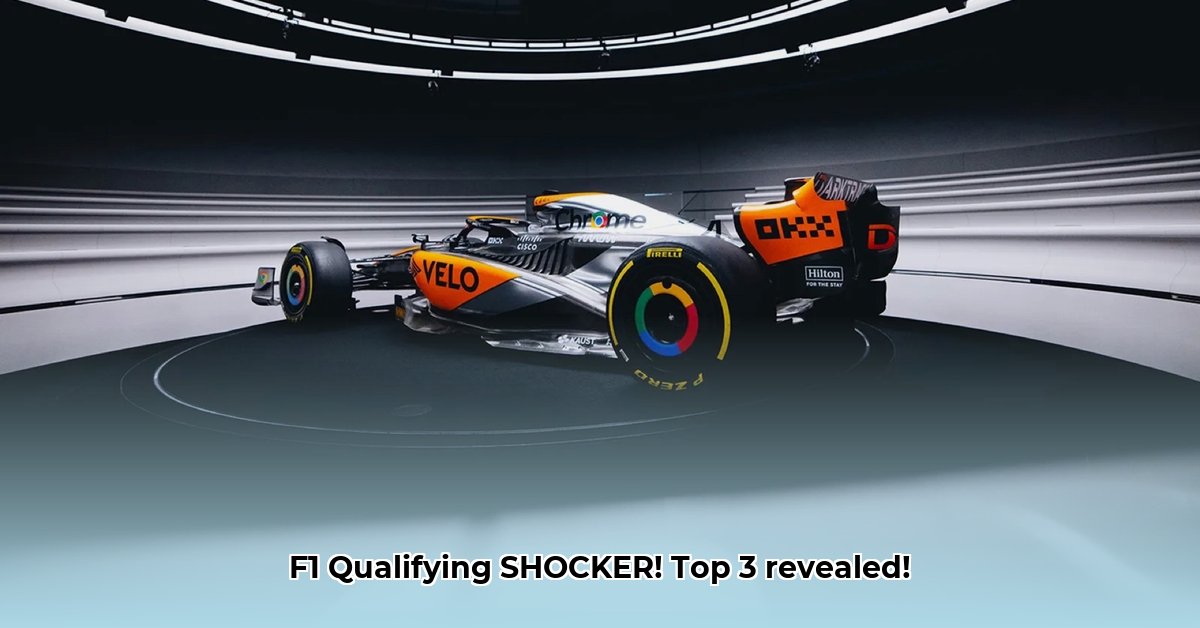
A Canadian Grand Prix Qualifying Deep Dive: Russell's Stunning Pole
The Canadian Grand Prix qualifying session delivered a real shocker, leaving fans and pundits alike buzzing. George Russell, piloting his Mercedes, snatched pole position from the usually dominant Max Verstappen and Oscar Piastri, leaving many scratching their heads. This wasn't just about raw speed; it was a masterclass in strategy, highlighting the critical role of tyre management, quick thinking, and a dash of luck.
A Qualifying Session Story: From Q1 Chaos to Q3 Triumph
Qualifying's opening session (Q1) saw the usual suspects comfortable, setting competitive times. However, things took a dramatic turn when Alex Albon's Red Bull experienced an engine cover malfunction, triggering a red flag and disrupting the rhythm. Further drama unfolded with Yuki Tsunoda's penalty after an incident, significantly impacting his starting position.
Q2 saw a divergence in strategy. While several teams opted for the softest compound tyres, pushing for one ultimate fast lap, Russell’s Mercedes team chose a bold, different strategy: the medium compound C5 tyres. This was a high-stakes gamble.
The final round (Q3) was a nail-biting affair. The top three were separated by mere hundredths of a second, a testament to the skill and precision required at this level. Russell's medium tyre gamble paid off big time, delivering a stunning final lap. Verstappen, despite his maximum effort, couldn't quite match Russell's pace.
Tyre Strategies: The Medium-Tyre Masterclass
Russell's medium tyre strategy was the defining factor. Most teams assumed the softest compound (C6) would be the quickest, prioritising immediate grip and rapid lap times. But Mercedes’ data analysis suggested that Montreal’s low-grip circuit wouldn't degrade the medium tyres as quickly.
This meant that Russell's tyres would retain more performance for longer, proving crucial in the later stages of qualifying. It was calculated risk-taking elevated to an art form, a testament to Mercedes’ profound understanding of both their car's strengths and track conditions.
The Impact of Incidents: Tsunoda's Penalty and Albon's Woes
Albon's engine issue caused a significant delay, disrupting the flow of the session and forcing drivers to adapt their strategies on the fly. Tsunoda's penalty added another layer of complexity. These incidents powerfully illustrated the unpredictability of qualifying and the need for adaptability and swift decision-making.
Team Performance: A Three-Way Fight
Mercedes, Red Bull, and McLaren dominated, each team displaying exceptional engineering and driver skill. The race wasn't solely about raw car speed; strategic choices and the ability to extract maximum performance under pressure were equally critical. The small details – car setup, pit stop efficiency, driver ability – all played their part.
Penalties: Reshaping the Grid
Tsunoda's ten-place grid penalty, along with other grid penalties, reshuffled the starting grid significantly. This highlights the fact that qualifying’s results aren't etched in stone until the final penalty decisions are made.
Actionable Insights: A Path Forward
The following table outlines key focus areas for various stakeholders:
| Stakeholder | Short-Term Focus | Long-Term Focus |
|---|---|---|
| Mercedes | Optimise race pace, refine medium/soft tyre strategy | Continue tyre strategy development, ongoing car improvement |
| Red Bull | Fine-tune car setup, close the gap to Mercedes | Consistent car speed improvement, better overall race pace |
| McLaren | Improve qualifying performance, target better grid positions | Enhance overall car performance, attract top-tier talent |
| Other Teams | Identify improvement areas, refine strategies | Improve car performance, aim for better race results |
| FIA | Review incident handling procedures | Implement improvements for increased track safety standards |
Conclusion: Setting the Stage for a Thrilling Race
The Canadian Grand Prix qualifying session was far from just a qualifying session. It demonstrated the crucial role of strategic thinking, relentless adaptation, and the unpredictable nature of motorsport. The race itself promises to be an electrifying spectacle. Don’t miss it!